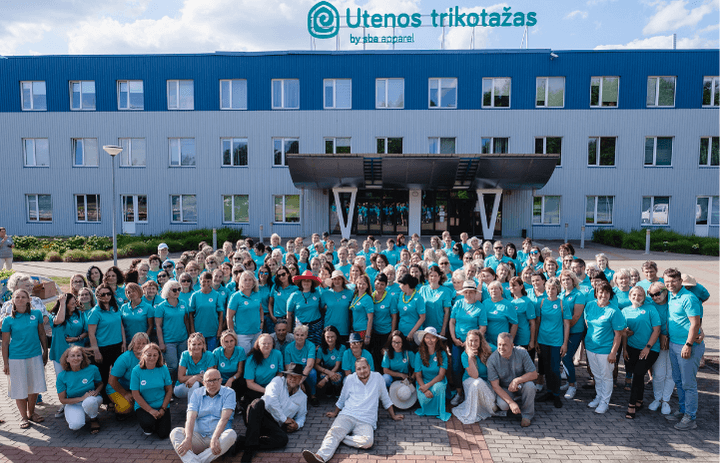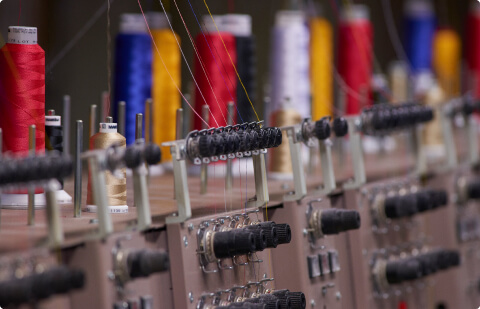Is There a Future for Synthetics in Textiles?

Recycled, Bio-based or Biodegradable – Are We Doomed to Compromise?
The rise of green movements and the pressing need for sustainable practices have led to growing criticism of synthetic materials, such as polyester, polyamide and nylon. Even the recycled one! Once celebrated for their durability, flexibility, thermo-insulation, and other great technical features, they are now under scrutiny for their environmental impact.
Laura Tutkuviene, Export Sales Manager at Utenos Trikotažas, highlights the paradox of synthetics. She emphasizes that when evaluating the sustainability of certain materials, one must consider the full context. Often, the focus is solely on production or recycling, without including other essential elements, such as the wear cycle.
“Responsible wearing of our clothes is also very important. A garment responsibly crafted from synthetic fibers and worn for 10 or more years exhibits a higher level of sustainability compared to a fast-fashion garment that is discarded after just one trendy season,”
says Laura.

Rethinking Synthetic Materials
One way of making things better is Eco-design, which focuses on using recycled materials whenever possible. This transition aims to make virgin materials less popular, driven either by social awareness or taxation. The textile industry is also considering the chemical recycling of recycled materials, effectively converting them back into their original form. This innovative approach can potentially reduce the demand for virgin materials, such as rPET (recycled PET) used in polyester textiles.
This means over 95% of the rPET stock used for polyester textiles could disappear. The development work with bio-plastics might be able to fill 5% of the loss. Extra points if the garment is durable, easy to repair and recyclable.
The Rise of Bio-Based Alternatives: A Double-Edged Sword
The textile industry is witnessing the emergence of more ecological bio-based and biodegradable fibers. These fibers are often derived from non-food crops or food waste, minimizing their greenhouse gas emissions.
Synthetics with enhanced biodegradation are gaining attention due to their potential to reduce landfill pollution associated with supply chain waste. However, they often have a shorter lifespan compared to traditional synthetics.
“While bio-based alternatives address one environmental concern, they raise questions about durability and longevity,“ Laura notes.
Recycled-content nylon is another promising development, with claims that it can reduce CO2 emissions by as much as 50%. Yarns made from post-consumer garment waste, factory scraps, old carpets, or ocean-bound plastic bottles and fishing nets can help divert waste from landfills and reduce microplastic pollution in our oceans.
“At Utenos Trikotažas, we are currently in the process of developing several bio-based synthetic alternatives, mainly from leftovers of various industries,” Laura exclaims with enthusiasm.

Bio-based materials, derived from renewable resources like natural fats and oils, have the potential to significantly reduce the environmental impact of synthetic textiles. While bio-based polyester currently represents a small portion of total production, it can reduce greenhouse gas emissions if adopted on a larger scale.
By embracing bio-based alternatives, enhancing transparency, and advocating for eco-friendly practices, the industry can lead the way in creating a more sustainable and responsible future for synthetic materials in textiles.
“Let’s not be naive – we will always need that spandex! So, one way or another, synthetics are here to stay. It’s only a matter of the resources and technology of how we’re going to do it.”
Let’s Meet at ISPO MUNICH

The next great occasion to discuss the present and future of textiles will be at ISPO Munich, where Utenos Trikotažas is showcasing its latest developments for activewear brands. Be sure to come by, if you‘re there.
For any inquiries or additional information, please feel free to reach out to Laura Tutkuviene, at laura.tutkuviene@ut.lt or via cell phone at +37061153099.
STAY UP-TO-DATE WITH UTENOS TRIKOTAŽAS BY SIGNING UP FOR OUR NEWSLETTER – NEVER MISS AN UPDATE!
About Utenos Trikotažas
Utenos Trikotažas Group stands as one of the largest and sustainable knitwear manufacturers in Central and Eastern Europe. Our specialized focus lies in on-demand ready-to-wear production and jersey fabric development, covering the entire production process from yarn to finished products. Collaborating with leading international brands across the fashion, performance, and sustainable lifestyle sectors, Utenos Trikotažas exemplifies excellence.
As a part of the SBA Group, comprising 30 companies and employing over 4,000 professionals, Utenos Trikotažas operates three factories. Our organization places a premium on environmental and social responsibility, utilizing organic fibers, and non-toxic chemicals, ensuring fair employee compensation, and maintaining transparent production processes. In 2020, Utenos Trikotažas became the first company to comply with Greenpeace textile procurement standards.


